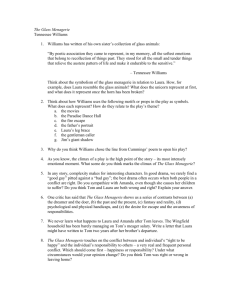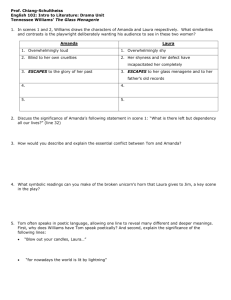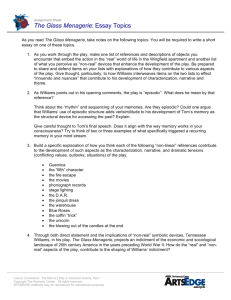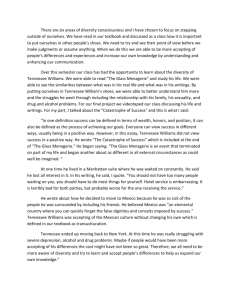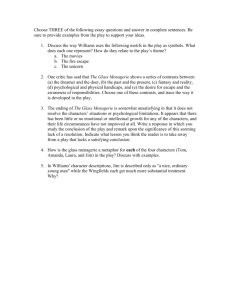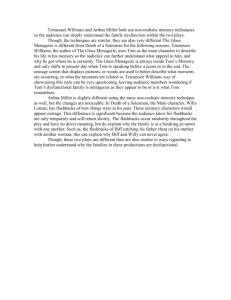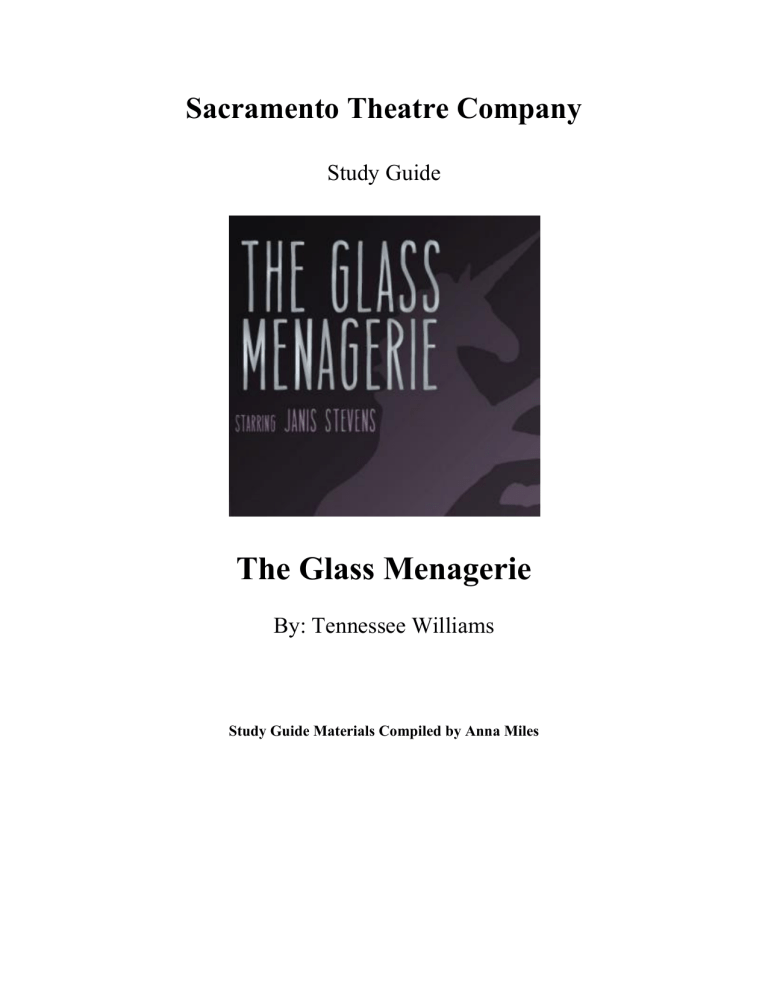
Sacramento Theatre Company Study Guide I Oughta Be in Pictures The Glass Menagerie By: Tennessee Williams Study Guide Materials Compiled by Anna Miles Sacramento Theatre Company Mission Statement The Sacramento Theatre Company (STC) strives to be the leader in integrating professional theatre with theatre arts education. STC produces engaging professional theatre, provides exceptional theatre training, and uses theatre as a tool for educational engagement. Our History The theatre was originally formed as the Sacramento Civic Repertory Theatre in 1942, an ad hoc troupe formed to entertain locally-stationed troops during World War II. On October 18, 1949, the Sacramento Civic Repertory Theatre acquired a space of its own with the opening of the Eaglet Theatre, named in honor of the Eagle, a Gold Rush-era theatre built largely of canvas that had stood on the city’s riverfront in the 1850s. The Eaglet Theatre eventually became the Main Stage of the not-for-profit Sacramento Theatre Company, which evolved from a community theatre to professional theatre company in the 1980s. Now producing shows in three performance spaces, it is the oldest theatre company in Sacramento. After five decades of use, the Main Stage was renovated as part of the H Street Theatre Complex Project. Features now include an expanded and modernized lobby and a Cabaret Stage for special performances. The facility also added expanded dressing rooms, laundry capabilities, and other equipment allowing the transformation of these performance spaces, used nine months of the year by STC, into backstage and administration places for three months each summer to be used by California Musical Theatre for Music Circus. Sacramento Theatre Company can accommodate 292 patrons in the proscenium-style auditorium of its Main Stage, while the Pollock Stage offers a more intimate experience with only 87 seats in a black box-style theatre. Both provide good acoustics and sight-lines. This professional, Equity theatre presents seven professional productions per season with a reputation for excellent stage adaptations of classic literature. Three annual productions in the Cabaret Stage, which seats 100, round out the experience with high-quality Broadway musical revues. The Young Professionals Conservatory, a training program for young theatre artists, was founded in 2003. The program, as well as the entire STC School of the Arts, is directed by Michele Hillen-Noufer. For further information about the Sacramento Theatre Company please visit us online: http://www.sactheatre.org The Glass Menagerie Sacramento Theatre Company Production Study Guide Contents Information on the Playwright* The Duality of Tennessee Williams 4 Information on the Play* Synopsis Characters What is the Underlying Truth? 6 7 8 Interactive Materials** Study Guide Questions: The Glass Menagerie Study Guide Questions: Engage With the Play Theatre Etiquette Additional Reading/Study Material 11 13 15 16 *Study guide materials published with permission from the Utah Shakespeare Festival (www.bard.org) **Written by Anna Miles for the Sacramento Theatre Company Study Guide Materials Compiled by Anna Miles The Duality of Tennessee Williams By Amanda Caraway As we celebrate the 100-year anniversary of the birth of American writer Tennessee Williams it is an excellent time to reflect on the incredible influence that he has had on contemporary theatre. Williams is arguably the most significant playwright of the American theatre, as well as one of the most important twentieth century writers in the world. Like many creative geniuses, Williams died alone and depressed, never guessing at the popularity his work would enjoy after his death. For those who have studied Williams it is hard to reconcile his extraordinary popularity with the harshness of his critics. He was considered by some to be a genius and master of the canon, but others dismissed him as a neurotic substance abuser who wrote offensive material. It is not difficult to understand why Williams himself struggled to understand these contradictory responses from the public and the theatre critics. Born in Mississippi in 1911 as Thomas Lanier Williams, he christened himself Tennessee after his father’s birthplace when he moved to New Orleans in 1939. Williams had an amazing output of work during his life. He is best known for his plays and film adaptations, but he also wrote poems, short stories, and novels. His first big hit came in 1945 in Chicago with the opening of The Glass Menagerie. This success was followed by the even greater success of A Streetcar Named Desire, which launched the stage career of Marlon Brandon and began a series of successful collaborations between Williams and popular stage and film director Elia Kazan. Williams quickly became a rich and famous writer. He won several awards including two Pulitzer Prizes for drama, four New York Drama Critics' Circle Awards, and one Tony Award for best play. President Jimmy Carter presented him with the Presidential Medal of Freedom in 1980. Williams had fifteen plays produced on Broadway between 1945 and 1961. Throughout his career, he was simultaneously praised and denounced for addressing taboo subjects in an open and realistic way. In 1956, Roman Catholic Cardinal Spellman blacklisted him for writing the screenplay Baby Doll. A central topic in all of Williams’s plays is the “undressing of male and female sexual desire” (Robert F. Gross, editor, Tennessee Williams: A Casebook [New York: Routledge, 2002], 35). In A Streetcar Named Desire, Williams showed violence never before seen onstage, and Cat on a Hot Tin Roof dealt with many sexual questions never before discussed onstage. His plays often show women as creatures who actively experience desire instead of just being objects of desire. After viewing Cat on a Hot Tin Roof, Brooks Atkinson, Broadway’s leading critic said that Williams is a “master dramatist with a terrifying knowledge of the secrets of the mind.” Williams was a perfectionist who constantly revised his work. Scholars believe that he used his writing to explore issues and situations from his own life. A perfect example is seen with The Glass Menagerie, which is considered an autobiographical play. However, some feel that Williams is represented in the play not by Tom, but by Laura. Williams was an effeminate boy who was called “Miss Nancy” by his father. He was a shy and socially awkward child who was teased by his classmates (Gross, 45). He was also handicapped for a time during his childhood due to illness. He was very close to his sister who was diagnosed with schizophrenia and spent most of her adult life in mental hospitals. In an effort to treat her, Williams's parents authorized a prefrontal lobotomy in 1937 at the Missouri State Sanitarium, and the operation incapacitated Rose for the rest of her life. It is thought that this horrifying experience prompted the writing of his most disturbing play Suddenly Last Summer, and might have contributed to his alcoholism and his dependence on various combinations of amphetamines and barbiturates (Gross, 45). Although his work in the theatre made him famous in the States, his films made him an internationally known figure. Seven of his plays as well as his novella The Roman Spring of Mrs. Stone were adapted for the screen during his lifetime. Williams’s work was well suited to film because he addressed subjects that were appealing to the film industry, including “the irregular passages of romantic life, the moral and psychological contradictions of sexual desire, the unavoidable discontents of family relations, and the exotic and perverse nature of Southern culture” (R. Barton Palmer, Hollywood’s Tennessee : the Williams films and postwar America, 1st ed [Austin: University of Texas Press, 2009], IX). In the mid ’60s, the critics seemed to turn on him and began writing vindictive reviews that said Williams had lost his edge (Gross, 35). He also began to lose his popularity with audiences, and his plays started closing after disappointingly short runs. What caused this shift after such a period of rampant popularity? Some believe it was a response to his increasingly open homosexuality. Williams himself alluded to this belief in interviews. However, the shift in popularity also seems to coincide with his shift in writing style. Williams began writing in a new style that did not sit well with audiences and critics. His plays became increasingly less realistic and more idea driven rather than plot driven. This shift in popular opinion caused Williams to experience a frustration commonly felt by artists: the style in which he wanted to write and the topics that he wanted to address did not necessarily coincide with the tastes of his public. He openly expressed a need to do the work that he felt was important, yet he still seemed to crave public approval. This created the impossible, and common, situation of an artist wishing to push audience members farther than audiences want to be pushed. When Williams spoke to Yale drama students in 1973 he confessed, “The truth is that I don’t know whether or not I can ever again receive a persuasively favorable critical response to work in this country.” His feelings about this rejection may have contributed to his continued decline. In the ’70s, Williams began work on his Memoirs, which was published in 1975. This autobiographical book is written in the style of free-association that he learned in psychoanalysis. The book gives an open account of his homosexuality as well as his work in and out of the theatre. In the introduction to Memoirs Williams says that today’s audience members seem to be “obdurately resistant to my kind of theatre.” He reasoned that that they “seem to be conditioned to a kind of theatre which is quite different from the kind I wish to practice.” He went on to say “I am quite through with the kind of plays that established my early and popular reputation.” Some believe that the open accounts of his sexual past detailed in Memoirs may have further contributed to his continued loss of popularity. Regardless of the reason, it is true that the works created at the end of his life were basically ignored. Williams died on February 25, 1983, alone in a hotel room as a depressed alcoholic with writer’s block (Gross, 35). His later works were re-examined after his death, and many scholars believe that they were not given fair treatment during his lifetime. Both popular and scholarly writing about Williams and his work exploded after his death. It is almost certain that Williams died having no idea of the popularity that his life’s work would enjoy almost thirty years later. Synopsis: The Glass Menagerie In this memory play, narrator Tom Wingfield who is also a character in the play, tells the story from his memories. Set in St. Louis in 1937, Tom works a tiresome job in a shoe warehouse in order to support his mother, Amanda, and his sister, Laura. His father, Mr. Wingfield, left the family years ago, and with the exception of one postcard, has not been heard from since. But his presence is pervasive, as his picture still hangs in the family’s living room. It is dinnertime in the Wingfield home; and Amanda regales, once again, tales of her many suitors as a young women in the South. She is disheartened by Laura’s profound shyness and her inability to attract men the same way she did. In hopes of helping her gain some confidence, Amanda enrolls Laura in a business college. Weeks later, Amanda discovers that Laura has dropped out without telling her. Amanda decides something must be done to find suitors for Laura. She starts selling magazine subscriptions in order to earn extra money, something Amanda is sure to bring the men calling. Meanwhile, Tom is miserable at work and seeks distraction in the movies, drinking, literature, and writing, much to his mother’s disappointment. He knows his mother and sister rely on his income, but he feels trapped. Tom and Amanda argue frequently, and during one of their quarrels, Tom accidently breaks several of Laura’s prized glass figurines. The next morning, Tom apologizes to his mother and they talk about his restlessness and Laura’s prospects. She asks him to keep an eye out for “nice, young men” at the warehouse to introduce to Laura. A few days later, he invites Jim O’Connor, a casual friend, home to dinner. Amanda is ecstatic and wants everything to be perfect. The next evening, Amanda prepares an elaborate meal and insists Laura wear a new dress. Laura is petrified, especially when she discovers that Jim is the same person she had a crush on in high school. Tom and Jim arrive, and Laura, still terrified, quickly leaves the room. The men discuss their jobs at the warehouse, and Tom admits to Jim that he has used the money for their electric bill to join the Merchant Marines and leave his job and family, seeking adventure in the world. Throughout dinner, Laura feigns illness while Amanda is a reincarnation of her flirty younger self. As dinner ends, the lights go out as a result of the unpaid electric bill. Candles are lit and Amanda encourages Jim to keep Laura company while she and Tom clean up dinner. At first Laura is paralyzed by her shyness when Jim joins her, but, once they start talking, she begins to come out of her shell. They reminisce about how they knew each other in high school and the nickname, “Blue Roses,” he had for her. Things continue to go well between Laura and Jim and they enjoy each other’s company. Will Laura finally be able to overcome her shyness? Will Tom actually abandon his position as family breadwinner? Can Amanda let go of the past and help her children find their futures? The answers all lie in the conclusion of this classic American drama of a dire family’s challenges and fragility. Characters: The Glass Menagerie Amanda Wingfield: Laura and Tom’s mother, Amanda is a proud, vivacious woman who clings to memories of the past and is at the same time courageous and foolish, charming and pitiable. Laura Wingfield: Amanda’s daughter and Tom’s older sister, Laura suffers the results of a childhood illness which left one of her legs malformed and in a brace. As a result, Laura is painfully shy and has withdrawn herself the outside world. She is much like her beloved glass figurines: delicate and frail. Tom Wingfield: Amanda’s son and Laura’s younger brother, Tom supports his mother and sister by working at a shoe factory, but he aspires to be a poet. Like the others, he is trapped, and must decide what measures to take to escape his life’s tediousness. Jim O’Connor: The gentleman caller, Jim is an old high school acquaintance of Laura and Tom and now works in the same shoe factory as Tom. Mr. Wingfield: Amanda’s husband, and father of Laura and Tom, Mr. Wingfield is a handsome man who worked for a telephone company. He abandoned the family long ago and never actually appears onstage. His picture, however, is prominently displayed in the Wingfield’s living room. What is the Underlying Truth? By Elaine P. Pearce One of the best known plays of the American theatre, The Glass Menagerie was Tennessee Williams’s first critical and financial success. The play opened to a small audience in Chicago on a chilling December 26, 1944, but “by the third week . . . the house was packed every night. Soon the play was grossing $15,000 weekly, almost five times the take of the first week” (Norma Jean Lutz, “Biography of Tennessee Williams,” Bloom’s BioCritiques Tennessee Williams, ed. Harold Bloom [Philadelphia: Chelsea House Publishers, 2003], 7-8). Its success continued when the play opened in New York on March 31, 1945, where it had a run of 563 performances and earned Williams his first New York Drama Critics’ Circle Award for the best play of the year, the Donaldson Award from Billboard magazine, and the Sidney Howard Memorial Award from the Playwrights Company (Lutz 9). The Glass Menagerie went through several incarnations before it opened in Chicago. The short story, “Portrait of a Girl in Glass,” was completed in 1943. Later that year, Williams rewrote the story into the unsuccessful script, “The Gentleman Caller,” while working as a screenwriter in Hollywood for MGM. In 1944 the work evolved into The Glass Menagerie. Williams had originally doubted the play would have a broad appeal for audiences because the material was so personal (Lutz 42). Throughout his career, his life provided the material for his writing, but his writing was the means of coping with his life. Gore Vidal believed that Tennessee Williams, “could not possess his own life until he had written about it.” He remembers Tennessee rising early each morning to write, often reworking a story that had already been published (Introduction, Tennessee Williams Collected Stories [New York: Ballantine Books, 1985], xxiii). Interpreting and reinterpreting details of his life ultimately gave him a sense of control over his past, a degree of understanding if not an acceptance. The Glass Menagerie is a memory play. Tennessee Williams tells us this in his production notes, stage directions, and the first speech of the play. He believed that “truth, life, or reality is an organic thing which the poetic imagination can represent or suggest, in essence, only through transformation.” His staging rejects the concrete reality of many of the plays of the era to give “a more penetrating and vivid expression of things as they are” (The Glass Menagerie, Tennessee Williams: Plays 1937-1955, eds. Mel Gussow and Kenneth Holditch [New York: The Library of America, 2000] 395). What is the underlying truth of The Glass Menagerie? The plays deals with the isolation that people feel when they cannot connect to each other or the world at large. Williams used his own isolation and that of his family. The Glass Menagerie mirrors Tennessee Williams’s life. Born Thomas Lanier Williams, Tennessee had a difficult childhood, suffering from diphtheria followed by Bright’s disease, which made it impossible for him to walk for the next two years. Throughout his illness, his mother was his devoted nurse, and his sister Rose, just sixteen months his elder, was his constant playmate, making his convalescence a happy time as they sailed paper boats, collected bits of brightly colored broken glass from garbage cans, and listened to the amazing tales of their nurse Ozzie. When Tennessee’s mother and father married, his father worked for the telephone company but left that job to work as a traveling salesman while his wife and young family lived with her parents. They did not have a home of their own until Rose was eight and Tom was seven, and then their father was emotionally distant. In the 1930s, when this play takes place, Tennessee was compelled to work for a shoe company. It was a time when his father dictated his choices in life, having pulled him out of school because he had failed ROTC in his third year at the University of Missouri. Like Tom, he hated the job. Like Tom, he earned $65 a month. Unlike Tom, he could not be fired nor could he easily leave. Instead he worked as poorly as he could, disappearing to the roof every half hour or so to smoke a cigarette and ponder a poem or short story he was writing. Together Tom, Amanda, and Laura Wingfield create one of the most memorable plays of the American theatre. Initially, The Glass Menagerie seems to be Tom’s play. As narrator, he sets the scene and is the presenter of illusions that hold the truth. After introducing the characters, he concludes, “I think the rest of the play will explain itself” (401). Once Tom enters the Wingfield apartment, his mother is in full control. Tom may be the stage manager of the play, but Amanda is director, designer, and producer of the family’s existence. In the first scene, Amanda instructs Tom on the proper way to eat his supper, undoubtedly not for the first time. Her lecture on “mastication” would offend any male in his twenties. Later she demands that he sit still while she brushes his hair to work on his cowlick. Amanda treats him like a child and rails against him for not being a man. Nothing he does is acceptable. He does not earn enough money, he wastes his time at the movies, he smokes too much, he drinks. Her anger toward her absent husband is focused on Tom, and she attacks any real or imagined similarity to his father. Amanda projects her past onto her family’s present and future. She sees her children as extensions of herself, not as separate individuals. Her children know her story of the seventeen gentlemen callers by heart. Tom even provides the cues she needs to keep the story going. Amanda married for love, truly loves her children, but perhaps she loves herself even more. In the first scene of the play, Amanda refers to Tom as “son,” but Laura is “sister” and “little sister,” not daughter. When the gentleman caller arrives, everything is carefully staged—the apartment, Laura, and most noticeably Amanda herself dressed as the bell of the ball, her southern accent even more pronounced. When Laurette Taylor, the remarkable actress who played the first Amanda Wingfield, met Tennessee Williams’s mother, she reportedly asked, “Well, Mrs. Williams, how did you like yourself?” Edwina was a genteel Southern woman, who married a telephone man and suffered long distances both physically and emotionally in her marriage. She talked all the time. “She not merely talked–and talked–she had the ability to overcome friend and adversary alike, usually leaving them limp and defenseless under the sheer weight of words” (Lyle Leverich, Tom: The Unknown Tennessee Williams, [New York: Crown Publishers, Inc., 1995] 47-48). Edwina talked about her gentlemen callers, the DAR, salivary glands, and the fine art of mastication. Her silences were worse. She had a way of looking at her children to register a deep disappointment. Even though she was an ardent supporter of Tennessee’s writing, if she disapproved of any books that he was reading for his work, she got rid of them. Even though Amanda overshadows her, Laura is the true center of the play. Her extreme shyness makes it impossible for her to function in secretarial school. Instead she plays her father’s old phonograph records and dusts the glass animals to whom she has given personalities and emotions. In the production notes, Williams describes the music of The Glass Menagerie, “the lightest, most delicate music in the world and perhaps the saddest,” as “primarily Laura’s music” (396–7). Williams also calls for a shaft of light to fall upon Laura at particular points in the play—the argument scene and dinner with the gentleman caller—even though she is not engaged with the other characters. Laura is the means whereby we know and better understand the other characters. Tom is gentle with her, protecting her even though she is the older sibling. He understands her innocence and accepts her limitations. He also concedes to her intercessions between him and his mother. When Jim, the only boy she ever liked, “an emissary from a world of reality” (401), accidentally breaks the horn of her unicorn, her favorite glass ornament, changing it from magical to ordinary, Laura’s concern is for Jim. She does not want him to feel bad. When you think of Laura, you think of delicately spun glass, and “when you look at a piece of delicately spun glass you think of two things: how beautiful it is and how easily it can be broken” (396). Williams’s own sister, Rose, was high spirited and exuberant as a child but suffered emotional problems as she grew older. After high school she started business school with her brother. She “could not cope with the workload” or her instructor’s criticism and stopped going, “without telling her mother. She simply wandered about the city and Forest Park” (116). Eventually she was institutionalized in 1937, and in 1943 doctors assured her parents that a lobotomy would improve her condition, now diagnosed as schizophrenia. The surgery reduced her rages but did not restore her sanity. Even if Tom Wingfield, like his father, abandons his family, Tennessee Williams could not. His family provided the material for his writing, and his writing provided the support for his family. In 1945 he assigned half of the royalties of The Glass Menagerie to his mother. In 1948 he assigned half of the royalties of Summer and Smoke to Rose. In 1949 he arranged for Rose to be transferred from the state hospital to a private sanatorium. Throughout his life he endeavored to improve her comfort. He left the bulk of his estate for her care. He was always faithful to her. Study Guide Activities: The Glass Menagerie Adapted from Francis Hodge's Script Analysis in his book Play Directing: Analysis, Communication, and Style Fill out the following outline for The Glass Menagerie: I. Given Circumstances A. Environmental facts 1. Geographical location, including climate 2. Date: year, season, time of day B. Previous Action -- underline all lines that refer to incidents that happened prior to the start of the play II. Dialogue A. Choice of words -- How do the characters speak? Do their word choices seem formal or more every day? Do they use more short words or long words? How many words do you recognize and how many are new? Look up any words you don't know. What might each character's word choices say about who they are as a person? B. Choice of phrases and sentence structure -- Similar to A, what kind of phrases and sentences does each character use, and what do their speech choices say about their personalities? C. Choice of images -- What kind of images does each character use while describing things? What sort of feelings do these images evoke? D. Dialect -- do the characters speak with a dialect? How does this affect the overall story and atmosphere of the play? III. Characters Describe each character using the following categories: A. Desire -- what do they want most? B. Will -- how determined are they to achieve their desire? C. Moral Stance -- What are their values, what is their moral code? Are they honest? Dishonest? Fanciful? Rational? D. Decorum -- Describe the character's physical appearance as you imagine it. IV. Ideas/Themes A. What is the meaning of the title? What themes does it refer to? How does the title represent the play as a whole? B. What are some of the play's philosophical ideas? Find direct quotes from the play that seem to state philosophical thoughts that are important to the themes of the play. C. Implications of the action -- Determine how the characters' actions propel the play to the climax and ending, as well as to the overall theme of the play. D. Consider each scene -- determine the purpose of each scene in the play. What idea is it trying to convey? How does it help the overall idea? Study Guide Questions: Engage With the Play By Anna Miles Take charge of your theatre-going experience and make it your own by asking yourself questions before, during, and after watching a play. Questions to ask before the play: If you HAVE read the play: How did you envision the set, or the visual world of the play, while reading? How did you imagine the characters looked while reading the play? What themes did you notice repeating throughout the play? What images jumped out at you while reading the play? How would you describe the central theme of the play in one sentence? If you HAVEN'T read the play: Do you know anything about the play? If so, what do you know? In General: When you think about "theatre," what impressions come to mind? What does "theatre" mean to you? What do you expect your experience to be when you watch a play? Do you expect to be bored? Excited? Engaged? Curious? Angry? Tired? Questions to ask after the play: If you READ THE PLAY BEFORE SEEING IT: How did the production set differ from what you had imagined while reading the play? How was it similar? How did these changes affect your understanding of the story? Did the characters look different from how you envisioned them looking while reading the play? Did they sound different? Act differently? How did these changes affect your understanding and opinion of each character? How did these changes affect your understanding of the overall story? How did the themes and images you noticed while reading translate to performance? Did the same themes and images jump out at you? Did you notice new ones? Did this particular production seem to have the same central theme, or a different central theme from the one you discovered while reading? What elements of the staging, acting, or design helped convey the theme? Did they play gain or lose anything in performance? Did you enjoy reading it more, or watching it? If you DIDN'T READ THE PLAY BEFORE SEEING IT: How did the play live up to your expectations? Did it turn out the way you thought it would? Was your knowledge of the play correct? Were you able to follow the story? Which part of the story did you most respond to? What themes and images jumped out at you? Which character did you most relate to? Why? In General: How did this production change or confirm your original impressions of "theatre"? How did your experience watching the play differ from how you expected it would go? In your own words, how would you summarize the plot of the play? How is the plot different from the story, or the thematic implications, in the play? Did you feel the story was relevant to your life? How and why? Did you feel the story said something about our society, or about the world at large? If so, what? Do you feel this story is an important one to tell and keep telling? How and why? What kind of stories do you most respond to? Theatre Etiquette -Arrive at the theater on time. -Visit the restroom before the performance begins. -Turn off your cell phone. Do not speak on the phone or text during the performance. -Pay attention to announcements that are made prior to the show about the rules of the theater you are attending and the location of the fire exits. -Don't speak during the performance unless you are encouraged by the performers to participate. -Remember that the Overture (introductory music) in musical theater is part of the performance, so be quiet when it begins. -Do not take pictures during the performance. It can be very distracting to the actors and can cause a mishap. It can also be a violation of an actor's contract. -Remain in your seat for the entire performance. If you must leave, exit during intermission. In an emergency, wait for an appropriate break in the show. It is rude to get up in the middle of a quiet moment. -Do not eat or drink in the theater. -Do not put your feet up on the seats or balcony and do not kick the seat in front of you. -Don't put or throw anything on the stage. -Do laugh when the performance is funny. -Do applaud when it is appropriate during the performance. -Do applaud when the performance is over... this tells the performers and crew that you appreciate their work. -Stand and applaud if you really thought the show was great (a standing ovation). -Do not whistle, stomp your feet, or scream out to the performers except for a Bravo or Brava. Additional Reading Material The Collected Plays of Tennessee Williams The Portrait of a Girl in Glass, short story by Tennessee Williams The Gentlemen Caller, play by Tennessee Williams Blow Out Your Candles: An Elegy for Rose Williams by Susannah Jacob for The Paris Review http://www.theparisreview.org/blog/2013/12/05/blow-out-your-candles-an-elegy-for-rosewilliams/ The Selected Letters of Tennessee Williams 1920-1945 and The Selected Letters of Tennessee Williams Volume 2: 1945-1957 by Tennessee Williams, Albert J. Devlin, and Nancy Marie Patterson Tischler The World of Tennessee Williams by Richard Freeman Leavitt and Kenneth Holditch Tennessee Williams: A Guide to Research and Performance by Philip C. Kolin Student Companion to Tennessee Williams by Nancy Marie Patterson Tischler Character Constellation and Characterization in Tennessee Williams' "The Glass Menagerie" by Maria Fernkorn A Study Guide for Tennessee Williams's "The Glass Menagerie" from Gale Online Learning Resources http://www.gale.com/
